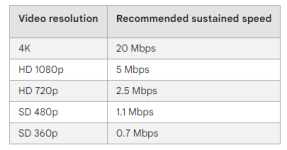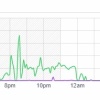Associate
- Joined
- 22 Dec 2018
- Posts
- 40
What would you say is a minimum speed needed to watch videos in 4k. Most companies say around 20mbps but have seen a few around 12-13mbps. But I very rarely can watch just a 5min YouTube clip in 4k with out buffering. Even if I pause for a few mins so the start can be loaded, it will still catch up n buffer. Sometimes 1080p will buffer. My broadband averages around 13/14mbps but has gone upto 20mbps and off peak hours is often over 15mbps. But can’t watch much without buffering in 4k and in peak hours 1440p buffers a lot. I’d say 20mbps minimum, but for at least 75% of time without issues, I’d say 30mbps. What’s your thoughts. Also I’m with EE on ADSL broadband. We’re 900m on the same road and nowadays can’t get much more than 14mbps early evening and 17 late. But anytime if day the upload won’t go above 870kbps yet syncs at 1160kbps. The download usually syncs around 18mbps but surprisingly it’s over 21mbps but doesn’t feel faster. The router is about 8 years old and not great. Would a newer decent one help improve ADSL speeds? It looks like bt won’t bring fibre to our road for another two years at least and Virgin is just too expensive unless you can afford tk
Commit to the top tv, phone and broadband packages. Some deals workout more money if you take landline phone out. Interested in other peoples views, and sure others will find this helpful.
Commit to the top tv, phone and broadband packages. Some deals workout more money if you take landline phone out. Interested in other peoples views, and sure others will find this helpful.





